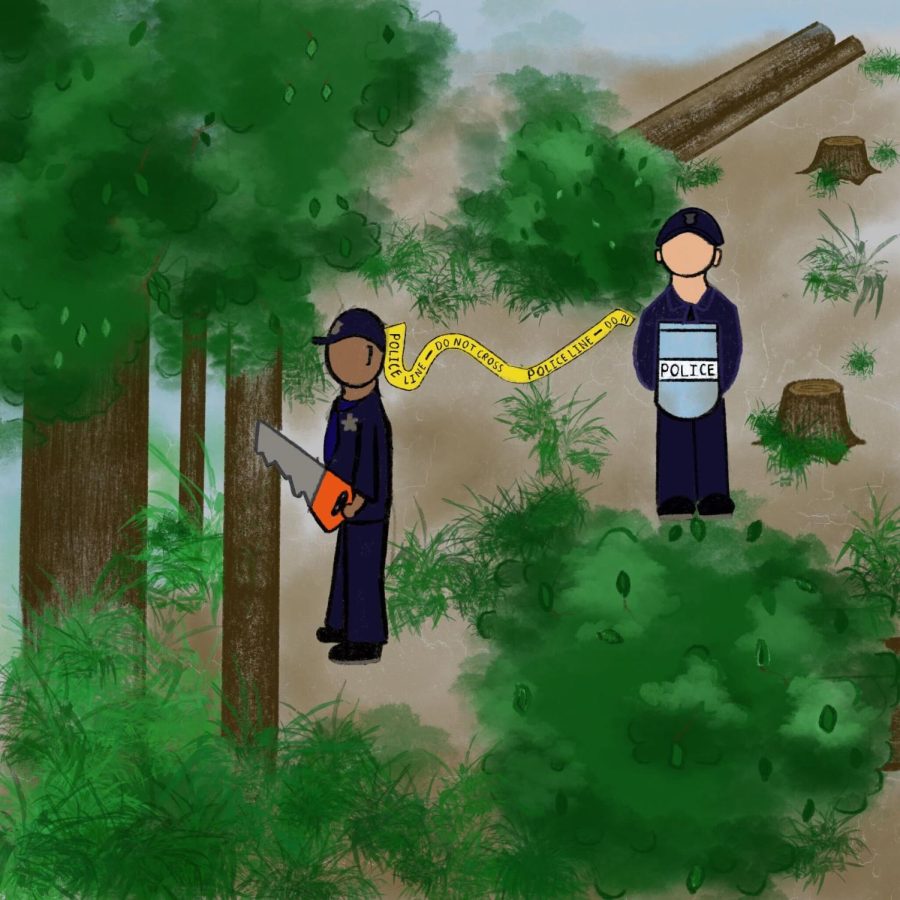Hargis: When Protests Fail
(Design by Brenda Payan Medina | The Daily Utah Chronicle)
July 1, 2023
If only to add to the horrifying soup of events the past two years have been cooking, the Atlanta city council has just greenlit a project to militarize their police force. Thousands of angry protestors watched as the poll they dreaded was released — the bill for Cop City to receive over $30 million in funding passed 11-4.
While Cop City is an exaggerated example of the struggle of modern protests, it’s evident that there’s a growing discrepancy between protesters and their effect on their chosen causes. Since 2020, the American public has been wrought with unrest. Police brutality, rising gun violence and the climate crisis are pushing people to their breaking point. As we fight against our increasing dissatisfaction, we express ourselves in the best ways we can — organization, activism and demonstrations. However, activism and demonstrations don’t always affect the problem we set out to fix. In fact, it sometimes feels that the problems only get worse.
When protests fail and demonstrations are squashed by authorities, it’s usually because the demonstrations are against further militarization of said authorities. The Cop City protests act as proof.
What’s Cop City?
Cop City is an Atlanta government-backed police and fire training center that will be built in the local forest surrounding the city. It will be an 85-acre stretch of land dedicated entirely to the training of Atlanta authorities. It will be built as a ‘mock city for real-world training’ in order to educate, encourage and recruit police officers in the area.
It will cost more than $60 million to build, $30 million of which come from taxpayers, according to the bill just passed.
Protesters and local environmentalists were appalled by the proposal to build such a site — it would not only cut down a huge portion of the natural forest but create a feeling of unrest among Atlanta residents. The day the bill was passed, protesters stood and spoke before the Council for nearly 14 hours, voicing such unrest.
The common fear is bigger than just the well-being of Atlanta’s environment and citizens, though. Protesters across the country worry that Cop City will embolden other police departments to further weaponize, which they consider a threat to public wellbeing.
This Has Happened Before
As Americans, activism is our right, and as civilians, the organization is our most powerful tool. However, American protests have been ignored before, and this can lead to dire consequences.
I can’t help but think of the protests against the war in Vietnam nearly five decades ago. Most protesters were young people and university students, advocating for peace when conflict overseas seemed pointless. They were concerned for the well-being of American soldiers and questioned the intentions of the war altogether. The protests were violently confronted by police forces in response. The opposition of the police came to a head when, on May 4, 1970, the National Guard shot 13 Kent University students at an anti-war protest. The war waged on, again, with no seeming cause.
The reason for the protests — peace — resulted in the exact opposite: violence. This parallels the protests of Cop City — Atlanta residents want peace, an untouched forest and a localized police force, yet they’re being met with ignorance from their government and violence from their authorities.
Militarization Will Always Get the Vote
A powerful police force isn’t inherently a bad thing. A technologically advanced yet community-based authority might be the most protective. However, scholars have noted the increased militarization of our current police system for years. Our authorities continue to focus less on keeping the peace and more on adopting the qualities of soldiers. And because of the profit that emerges from this process, politicians let it happen.
“Both the police and the government crackdown on those of us who are protesters, especially those of us who are part of progressive social justice struggles,” said Utah activist and organizer Ermiyah Fanaeian. “It’s very clear that the government and the police act as a force to stop protests from happening, and they act as a means of the states to put an end to any kind of dissent against [itself.]”
When politicians vote in a way that will ultimately perpetuate violence, the masses will hardly ever have a say. We saw this with the Vietnam protests and their ineffectiveness, we saw it with authority and media’s aggressive response to the (overwhelmingly peaceful) Black Lives Matter protests in 2020, and now we’re witnessing it with Cop City.
Protesting Even When it Seems Pointless
The bottom line is that the American political system is hardwired for militarization. That’s why the military gets a higher budget portion than education and employment combined. The government allows for militarization against the will of its people, and the recent Cop City decisions prove it. Cop City is a prime example of what happens when authoritarianism runs rampant within governments and citizens are ignored. And it’s a sure cause for worry.
However, while militarization means an attempt to instill control, to protest is to reject that control. Atlanta citizens showed us the power of protests — activists gathered in the thousands, all linked by the same obligation to protect their forest and their city. When we accept that we exist in communities with the same goals, we can begin to build power in our respective environments. And there is hope for our activism.
“When we build mass movements,” Fanaeian lamented, “every aspect of society — not just those of us who are political organizers, the hair Lady and the janitor and the teachers and the person who works at your local coffee shop — will start to be a part of our struggles. … I do think that at some point, our people’s movements are going to succeed in large numbers.”
Cop City is an example of authoritarianism, but it’s also an example of our numbers, and our innate ability to come together for a shared cause. And to me, that’s a sure cause for celebration.









